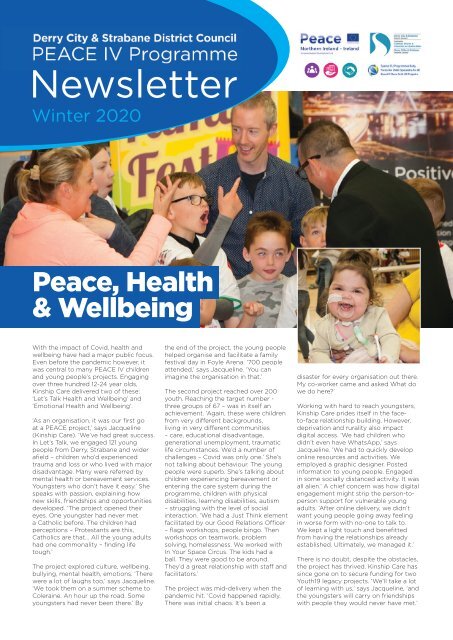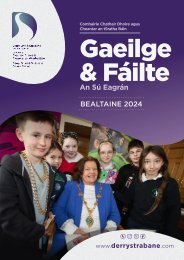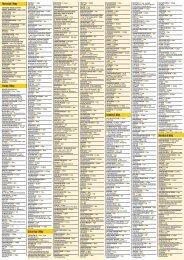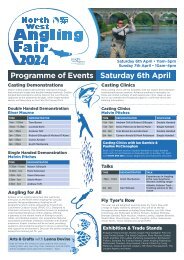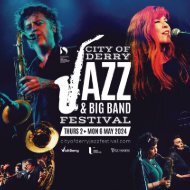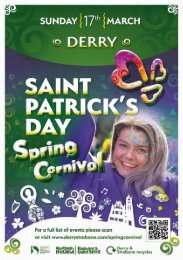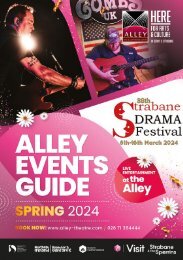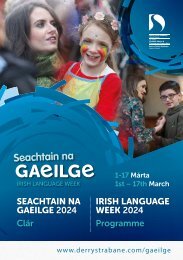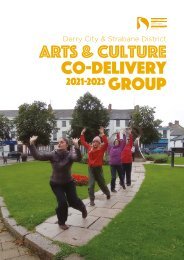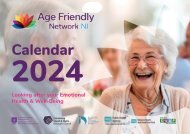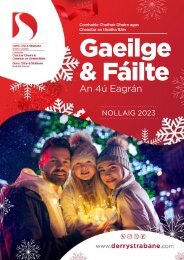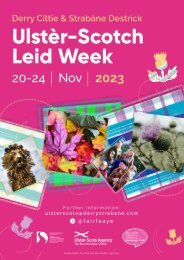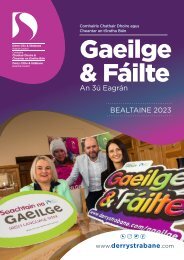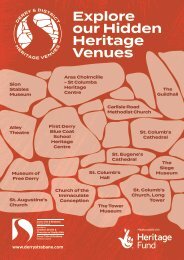Peace IV Newsletter November 2020
You also want an ePaper? Increase the reach of your titles
YUMPU automatically turns print PDFs into web optimized ePapers that Google loves.
<strong>Newsletter</strong><br />
Winter <strong>2020</strong><br />
<strong>Peace</strong>, Health<br />
& Wellbeing<br />
With the impact of Covid, health and<br />
wellbeing have had a major public focus.<br />
Even before the pandemic however, it<br />
was central to many PEACE <strong>IV</strong> children<br />
and young people’s projects. Engaging<br />
over three hundred 12-24 year olds,<br />
Kinship Care delivered two of these:<br />
‘Let’s Talk Health and Wellbeing’ and<br />
‘Emotional Health and Wellbeing’.<br />
‘As an organisation, it was our first go<br />
at a PEACE project,’ says Jacqueline<br />
(Kinship Care). ‘We’ve had great success.<br />
In Let’s Talk, we engaged 121 young<br />
people from Derry, Strabane and wider<br />
afield – children who’d experienced<br />
trauma and loss or who lived with major<br />
disadvantage. Many were referred by<br />
mental health or bereavement services.<br />
Youngsters who don’t have it easy.’ She<br />
speaks with passion, explaining how<br />
new skills, friendships and opportunities<br />
developed. ‘The project opened their<br />
eyes. One youngster had never met<br />
a Catholic before. The children had<br />
perceptions – Protestants are this,<br />
Catholics are that... All the young adults<br />
had one commonality – finding life<br />
tough.’<br />
The project explored culture, wellbeing,<br />
bullying, mental health, emotions. ‘There<br />
were a lot of laughs too,’ says Jacqueline.<br />
‘We took them on a summer scheme to<br />
Coleraine. An hour up the road. Some<br />
youngsters had never been there.’ By<br />
the end of the project, the young people<br />
helped organise and facilitate a family<br />
festival day in Foyle Arena. ‘700 people<br />
attended,’ says Jacqueline. ‘You can<br />
imagine the organisation in that.’<br />
The second project reached over 200<br />
youth. Reaching the target number -<br />
three groups of 67 – was in itself an<br />
achievement. ‘Again, these were children<br />
from very different backgrounds,<br />
living in very different communities<br />
– care, educational disadvantage,<br />
generational unemployment, traumatic<br />
life circumstances. We’d a number of<br />
challenges – Covid was only one.’ She’s<br />
not talking about behaviour. The young<br />
people were superb. She’s talking about<br />
children experiencing bereavement or<br />
entering the care system during the<br />
programme, children with physical<br />
disabilities, learning disabilities, autism<br />
– struggling with the level of social<br />
interaction. ‘We had a Just Think element<br />
facilitated by our Good Relations Officer<br />
– flags workshops, people bingo. Then<br />
workshops on teamwork, problem<br />
solving, homelessness. We worked with<br />
In Your Space Circus. The kids had a<br />
ball. They were good to be around.<br />
They’d a great relationship with staff and<br />
facilitators.’<br />
The project was mid-delivery when the<br />
pandemic hit. ‘Covid happened rapidly.<br />
There was initial chaos. It’s been a<br />
disaster for every organisation out there.<br />
My co-worker came and asked What do<br />
we do here?’<br />
Working with hard to reach youngsters,<br />
Kinship Care prides itself in the faceto-face<br />
relationship building. However,<br />
deprivation and rurality also impact<br />
digital access. ‘We had children who<br />
didn’t even have WhatsApp,’ says<br />
Jacqueline. ‘We had to quickly develop<br />
online resources and activities. We<br />
employed a graphic designer. Posted<br />
information to young people. Engaged<br />
in some socially distanced activity. It was<br />
all alien.’ A chief concern was how digital<br />
engagement might strip the person-toperson<br />
support for vulnerable young<br />
adults. ‘After online delivery, we didn’t<br />
want young people going away feeling<br />
in worse form with no-one to talk to.<br />
We kept a light touch and benefitted<br />
from having the relationships already<br />
established. Ultimately, we managed it.’<br />
There is no doubt, despite the obstacles,<br />
the project has thrived. Kinship Care has<br />
since gone on to secure funding for two<br />
Youth19 legacy projects. ‘We’ll take a lot<br />
of learning with us,’ says Jacqueline, ‘and<br />
the youngsters will carry on friendships<br />
with people they would never have met.’
Social distancing, sanitiser<br />
& environmental<br />
inspiration<br />
That saying? The one about a butterfly<br />
flapping its wings one place and<br />
causing chaos elsewhere? For many<br />
PEACE <strong>IV</strong> projects, delivery under<br />
Covid restrictions has felt chaotic. Not<br />
for the Riverine Environmental Project.<br />
‘Riverine is an environmental<br />
stewardship programme,’ says Allan<br />
Bogle, Riverine Officer. It’s September.<br />
Castlederg. For World Rivers day,<br />
two groups meet socially distanced<br />
in Castle Park. ‘Often we use rivers to<br />
divide,’ says Alan, ‘but Riverine uses<br />
rivers – the Finn, Dennett and Foyle -<br />
to connect.’ The project builds not only<br />
the skills and experience to care for<br />
natural resources, but also the desire.<br />
‘One good thing about lockdown is<br />
that people have spent time outside.<br />
People want to plant flowers. They<br />
want to count butterflies. Riverine is so<br />
now.’<br />
The cross-border, cross-community<br />
project has multiple elements. An<br />
adult heritage group learning about<br />
the natural and cultural heritage of the<br />
Riverine (wider Strabane/Lifford) area.<br />
A ‘Learning in the Landscape’ Saturday<br />
club for children. A ‘Growing Together’<br />
project around vegetable gardening.<br />
An ‘Environment Champions’ project<br />
with Deele and Dennet anglers<br />
and Donemana Men’s shed. An<br />
‘Environmental Explorers’ programme<br />
with Far and Wild including ‘walking<br />
through time’ (hiking), ‘gearing up’<br />
(mountain biking) and ‘River Explorers’<br />
(kayaking and paddle boarding).<br />
Amongst the castle ruins, children<br />
engage in rope games and river<br />
sampling, connecting to the<br />
environment and each other. ‘We’re<br />
inspiring young people to become<br />
custodians of the environment,’ says<br />
Allan. ‘It’s a relatively small group<br />
but they’re sharing with families,<br />
classrooms, social media. They’re<br />
influencers.’<br />
By the GAA pitch, adults are learning<br />
about wildflower meadows from<br />
Rachel Conway, Butterfly Conservation<br />
NI. ‘We’re going to gather seeds,’ she<br />
says. ‘No Ragwort – it’s amazing but<br />
the public associate it with weeds. No<br />
thistles – they’re fantastic but they take<br />
over. This is called birds foot trefoil.<br />
It’s a fantastic food for many of our<br />
butterflies. Loads of nectar and pollen.<br />
This yellow one’s meadow vetchling.<br />
That one’s marsh woundwort. Purple.<br />
Beautiful. Orchid-like. A great plant<br />
if you’ve wet ground. Now spread<br />
out folks and remember your social<br />
distancing.’<br />
One participant heard about the<br />
project in the paper. ‘It’s great to get<br />
outside,’ she says. ‘Get a bit of air.’<br />
Mags teaches in a primary school.<br />
‘I’m creating a wildflower meadow in<br />
the school,’ she says. ‘The wee square<br />
behind the church in Aughbrack would<br />
be perfect for a meadow,’ says another.<br />
Rachel produces a scythe. Thin blade.<br />
Grim reaper style. Demonstrates with<br />
a metal swish. ‘It’s a glide,’ she says.<br />
‘Handle in line with your hip. Scything<br />
is a wildlife friendly way of maintaining<br />
a meadow.’ She tells of finding tiger<br />
moth caterpillars. With a strimmer,<br />
they’d have been sliced.<br />
Participants gather. Blue wellies, green<br />
wellies, hiking boots. Gators. Bags<br />
with blazoned with: Don’t mow. Let it<br />
grow. She squirts the scythe handles<br />
with sanitiser. ‘They didn’t do that in<br />
Poldark.’ Laughter. Paddy steps up<br />
for a turn. Rachel instructs. ‘In contact<br />
with the ground at all times. Keep<br />
upright. Take small steps forward. If it’s<br />
tricky, try from another direction.’ The<br />
same could apply to a peace process.<br />
Or project delivery under Covid.<br />
‘It’s been fantastic delivering Riverine<br />
during these tough times,’ says Annie,<br />
Butterlope Farm. ‘Involvement really<br />
benefitted participants. Safe contact<br />
with new people, getting close to<br />
nature, exploring new places.’ She<br />
speaks of red squirrel week, wildlife<br />
cameras, pinemartins, hedgehogs<br />
and bat monitors. ‘Some of the<br />
reconciliation was like serendipity. It<br />
just happened. Irish names of plants.<br />
Ulster Scots traditions in Donegal.<br />
Links here with the GAA club. Burn<br />
Wood in Drumrallagh, Strabane, a<br />
hidden gem – none of our children had<br />
been in there before. It’s been a real<br />
escape from lockdown.’<br />
Over a lunchtime picnic, participants<br />
talk butterflies. Tortoiseshell. Peacock.<br />
Small White. It’s a radical process<br />
changing from a caterpillar to a<br />
butterfly but sometimes change isn’t a<br />
hard challenge. It’s a liberation.<br />
2 <strong>Peace</strong> <strong>IV</strong> <strong>Newsletter</strong> Winter <strong>2020</strong>
Celebrating Common<br />
Christian Heritage<br />
Late July and it’s<br />
bucketing like February.<br />
Just warmer. ‘See the<br />
rain?’ says Maureen. ‘It<br />
adds character.’ Arriving<br />
on foot at Greencastle<br />
Maritime Museum, raincoats<br />
dripping, is a group of<br />
around twenty. Joining<br />
the Bishop of Raphoe,<br />
Alan Mc Guckian on a<br />
270km Slí Cholmcille, or<br />
Túras Colmcille Camino,<br />
are PEACE <strong>IV</strong> participants<br />
from the Churches Trust<br />
‘Celebrating Our Common<br />
Christian Heritage’ project.<br />
‘I looked at the weather<br />
forecast on Friday,’ says<br />
Brian, Túras Colmcille<br />
Committee. ‘It didn’t have<br />
a drop of rain then.’ The<br />
socially distanced tea<br />
and scones are met with<br />
enthusiasm before the next<br />
leg.<br />
Walking by fishing boats<br />
at Greencastle harbour, the<br />
mood is buoyant. ‘Next year<br />
is the 1500 anniversary of<br />
the birth of St.Columba,’<br />
says the Bishop.<br />
This camino links places<br />
of significance to him.<br />
This walk is a proof of the<br />
concept.’ The path narrows,<br />
curls round the coast.<br />
Fairy doors, stones and<br />
shells painted by children,<br />
brighten the rocks.<br />
‘St.Colmcille is a great<br />
figure in Irish and Scottish<br />
heritage. Christians of<br />
all denominations can<br />
resonate in him. Pilgrimage<br />
also speaks to the heart<br />
of everyone, regardless<br />
of how devout. It’s about<br />
a challenging walk in an<br />
environment - a community<br />
and a personal thing.<br />
Something spiritually<br />
enriching for everyone,<br />
of every community.’ The<br />
discussion moves to the<br />
rhythm of damp footsteps.<br />
With Covid, staycations are<br />
‘in’. The 1500 anniversary<br />
year will run from 7th<br />
December <strong>2020</strong>-21 and<br />
there could be significant<br />
interest.<br />
At Shroove Lighthouse,<br />
the weather hardy group<br />
assembles to hear shared<br />
history. ‘The story goes,<br />
Columba was sailing up<br />
the Swilly when he decided<br />
he wanted one last walk<br />
on Irish soil. Afterwards he<br />
swore he’d never again set<br />
foot on Irish soil. Twelve<br />
years later he came back<br />
for the convention at Drum<br />
Ceat, but had Scottish sods<br />
tied to the soles of his feet.<br />
Drum Ceat resolved the<br />
power balance between the<br />
Scots, Irish, bards, poets<br />
and chieftains. Apparently<br />
it was held at the 18th hole<br />
in the golf course at<br />
Limavady’s Raddison Roe.’<br />
Pat, the local guide, leads<br />
onwards, squelch and<br />
swish, uphill to Port Cille<br />
and Inis head. ‘That’s<br />
where Colmcille came<br />
ashore on his way to Iona.<br />
He wanted to see Derry<br />
one last time.’ ‘That’s the<br />
Derry version,’ says one<br />
participant. Smiles. Much<br />
friendly banter has been<br />
aired on this project about<br />
Columban history. The site<br />
of his first monastery –<br />
Longtower? St.Augustines?<br />
‘There’s a wealth of shared<br />
information,’ says Geraldine,<br />
Churches Trust Project<br />
Organiser. ‘Covid stalled<br />
us, but now everything’s<br />
running again. People from<br />
all communities are very<br />
keen to get involved.<br />
Workshops on zoom. Day<br />
trips. They’re making links<br />
that the life of Columba is<br />
something they can share<br />
in.’<br />
The group is bubbling too<br />
with other culture and<br />
history. At Port Cille, Anne<br />
presents a wildflower<br />
bouquet - Honeysuckle,<br />
orange Montbretia, and<br />
Cloiginí dearg (Little<br />
Red Bells). Conversation<br />
on the route has been<br />
organically bilingual. On<br />
the hilltop, there’s an Eire<br />
sign. Numbered hills so the<br />
planes knew this was the<br />
free State during WWII.<br />
It’s 7km in sheet rain back<br />
to Greencastle. ‘Looks to<br />
be clearing,’ says Geraldine,<br />
‘But we’ve definitely done<br />
penance today.’ Joined<br />
by Rector David Houlton,<br />
Church of Ireland, and<br />
Rev Deacon Marlene<br />
Skuce, Methodist, there<br />
is a cross-community<br />
reflection before the lure<br />
of shelter and sustenance<br />
in the café accompanied<br />
by strains of Siyahamba<br />
(We are marching…)<br />
and Proclaimers walking<br />
10,000 miles… ‘What’s the<br />
difference between a good<br />
walk and a pilgrimage?’<br />
asks the Bishop. ‘Intention.<br />
A pilgrim takes what<br />
weather they get and still<br />
enjoys it.’<br />
It was damp and it was<br />
glorious. You could put a<br />
marching tune to that all<br />
right.<br />
<strong>Peace</strong> <strong>IV</strong> <strong>Newsletter</strong> Winter <strong>2020</strong> 3
Proud to Be -<br />
Beyond the Labels of Me<br />
August. Pride Week. On the stage,<br />
pools of blue light. ‘This is the year<br />
that the world came to a halt,’ begins<br />
the narrator. ‘…Expert after expert<br />
gave theories on the impact of<br />
isolation on mental health… People<br />
living on their own. Denied human<br />
contact. Craving the simplicity of<br />
a hug… When isolation is nothing<br />
more than the everyday normality,<br />
does a disconnected world seem any<br />
different? Pull up a chair. Sit down.<br />
And let’s talk.’ The spotlight falls on<br />
different actors as the show streams<br />
live to the online audience. Eight<br />
interwoven stories illuminate the<br />
diversity of LGBTQ+ lives.<br />
The ‘Proud To Be’ play, directed<br />
by Kieran Smyth and written by<br />
Mel Bradley, is the culmination of a<br />
cross-community, PEACE <strong>IV</strong> small<br />
grant project. Despite Covid19, it has<br />
thrived.<br />
‘We were lucky,’ says Kieran. ‘Our<br />
participants met in February. When<br />
lockdown hit, facilitating online was<br />
new. We put in a lot of planning and<br />
tried different exercises. By the 3rd or<br />
4th session the group developed an<br />
online chemistry. That surprised us.<br />
The virtual platform – the fact people<br />
were in their own houses – it created<br />
more self-reflection and honesty.<br />
Tuesday nights became a thing<br />
we looked forward to.’ Sat, socially<br />
distanced in the Playhouse courtyard,<br />
three participants reflect on the<br />
journey of the project.<br />
Through a series of workshops,<br />
participants considered cultures<br />
and identities, how people define<br />
themselves and others. ‘In Northern<br />
Ireland, our structural stuff is built<br />
around two sides. What if you don’t<br />
fit that?’ says Kieran. ‘Hopefully the<br />
audience will think about labels.<br />
Hopefully they’ll see the human<br />
connection beyond them.’<br />
The show gives voice to the message<br />
generated by the project’s twenty<br />
participants. ‘When I first read the<br />
script I must admit, I did blub a bit,’<br />
says Jennifer. ‘For me, it’s getting the<br />
story out there. We’re human beings<br />
like everyone else. The LGBTQ+<br />
community? Nobody gets into that<br />
Orange and Green, just their life and<br />
loves.’ ‘On stage are 3 gay men, a<br />
lesbian, a transwoman, a transman<br />
and a non-binary person,’ says Rory.<br />
‘But it’s people at the end of the day.<br />
People are all different. Size. Looks.<br />
Politics. Labels.<br />
Questions. My role as narrator<br />
is to take all that on, explaining.<br />
Questioning whether labels are useful.<br />
Do they empower or diminish? When<br />
you give out your truth, you go<br />
beyond labels.’<br />
The project has been powerfully<br />
intergenerational. ‘Because there’s<br />
different ages participating, you get<br />
the sense of change in society,’ says<br />
Jennifer. ‘Twenty years ago, it was<br />
hard to be out. Now it’s the thing<br />
to be seen. We want to educate<br />
and inspire the future LGBTQ+<br />
community.’ One character in the<br />
show recounts a 1980’s/90’s helpline.<br />
‘What does that tell you? If there’s<br />
a helpline for something there’s<br />
problems…’ The performance flows<br />
skilfully through issues like adoption,<br />
giving blood, marriage, names,<br />
pronouns, HRT. ‘Sometimes I feel like<br />
there was a whole life taken from my<br />
generation.’<br />
The project also explored conflict<br />
legacy, current issues and crossborder<br />
links including a Theatre of<br />
Witness workshop and an online<br />
cross-border workshop with Dublin’s<br />
Abbey Theatre. ‘Religion,’ says Kieran.<br />
‘How do we acknowledge the scars<br />
that have been left?’ Going digital<br />
enabled international refugee issues<br />
to be creatively explored. ‘We spoke<br />
via zoom with an Iranian asylum<br />
seeker in Morocco,’ says Kieran. ‘Seen<br />
kissing his partner, he was jailed<br />
for his sexual orientation. He was<br />
a professor of medicine. After his<br />
partner committed suicide in prison,<br />
he burned the Koran and fled. It puts<br />
our stories into perspective.’<br />
As the show ends, the narrator<br />
resumes the stage. ‘Stay curious,’ he<br />
says. ‘Ask questions and listen.’<br />
Proud To Be can be viewed at:<br />
www.youtube.com/watch?v=_<br />
xehJamirIw<br />
www.youtube.com/c/PlayhouseDerry<br />
4 <strong>Peace</strong> <strong>IV</strong> <strong>Newsletter</strong> Winter <strong>2020</strong>
Planes, Trains and<br />
Men’s Sheds<br />
The Paddock. Eglinton. Cue heavy<br />
downpour. A small huddle – socially<br />
distanced huddle – of men in flat caps<br />
and raincoats, gathers stoically with<br />
umbrellas.<br />
As the spring lockdown is slowly<br />
lifted, there are signs of life emerging<br />
from the PEACE <strong>IV</strong> Programme.<br />
A diverse range of survival tactics<br />
were employed across the sixty-five<br />
funded community projects. Many<br />
of those delivering <strong>Peace</strong> projects<br />
volunteered heroically in helping<br />
their local communities through the<br />
worst stages of the crisis. Some took<br />
to digital zooming like proverbial<br />
ducks to water. Others, like penguins<br />
to the Sahara. All communities were<br />
impacted – with variation depending<br />
on rurality, Wi-Fi access, deprivation<br />
and age/health profile of participants.<br />
By June <strong>2020</strong>, most found their way<br />
back into delivering peace work in the<br />
‘new normal’.<br />
The cross-community collaboration<br />
between the Glen and Eglinton Men’s<br />
Sheds is one of the first to hold a<br />
socially distanced launch. David is<br />
there waggling a 2metre stick – in<br />
jest, but also a pertinent reminder<br />
of social distancing. Part of the<br />
Council-led ‘One Community’ project,<br />
the Men’s Shed partnership had<br />
been established before lockdown.<br />
‘The Glen is one of the few crosscommunity<br />
areas in Derry’s cityside.’<br />
says Maurice from the Glen. ‘Still,<br />
this project is one of the first times<br />
we’ve done a joint project with<br />
another group. Martin, from Council,<br />
approached us and promoted the<br />
idea of Men’s Sheds working together.<br />
We made contact on the crosscommunity<br />
aspect with Eglinton.<br />
By coincidence, they came up with<br />
building an airplane and we were for<br />
building a train for kids in Dunluce<br />
Family Centre. The project became<br />
Planes and Trains. We liked the sound<br />
of that.’<br />
Bob, Chair of Eglinton Men’s Shed,<br />
explains today’s launch. ‘It’s a tribute<br />
to Eglinton’s history,’ he says. ‘In the<br />
winter of 1940/41, Eglinton airfield<br />
was built as an R.A.F. Station to<br />
protect the City and docks. The RAF<br />
took it over in 1943 as Royal Naval<br />
Air Station, Eglinton, and named it<br />
“HMS Gannet.”’ The wooden replica<br />
Spitfire is bursting with marigolds and<br />
geraniums. ‘Council funded the timber<br />
and flowers,’ says Bob. ‘It was a joint<br />
effort between ourselves and the Glen<br />
Men’s Shed to create the display. We<br />
enjoyed working together.’<br />
As the rain eases, there’s a shuffling<br />
and positioning around the Spitfire.<br />
It stands, pride of place, in the<br />
Paddock, easily viewed from the<br />
pavement beside Main Street, and<br />
an information panel at the wooden<br />
gate explains everything. ‘Last year<br />
Eglinton was awarded the “Most<br />
Improved” Award in “Northern Ireland<br />
Amenity Council’s Best Kept Awards”<br />
competition” says Bob. ‘This year’s<br />
competition was shelved due to<br />
Coronavirus, but this joint project<br />
should get us off to a “flying” start<br />
next year!” Official photos pronounce<br />
the project formally launched.<br />
After meeting twelve weeks of<br />
Tuesday morning meetings the<br />
rapport is evident. ‘We alternated<br />
venues,’ says Maurice. ‘We’ve a great<br />
relationship built up in the course of<br />
this and we want to keep that going.<br />
Hopefully we can grow that, as well as<br />
flowers, in the future.’<br />
<strong>Peace</strong> <strong>IV</strong> <strong>Newsletter</strong> Winter <strong>2020</strong> 5
Creative Centenaries -<br />
‘Dividing Ireland’ Exhibition<br />
Some say we should draw a line<br />
under the past. The ‘Dividing Ireland’<br />
exhibition is all about different<br />
perspectives on drawing lines -<br />
specifically red ones, on maps, 100<br />
years ago.<br />
‘This last exhibition for our decade<br />
of centenaries programme focuses<br />
on 1920-25 and Partition,’ says<br />
Bernadette Walsh, Archivist with<br />
the Council’s Heritage and Museum<br />
Service. ‘Using objects and archives<br />
from our own collections, we’ve linked<br />
significant issues and events to the<br />
local picture in Derry and Strabane.’<br />
The Tower Museum exhibition,<br />
launched by Mayor, Cllr. Brian<br />
Tierney, is part of a wider PEACE<br />
<strong>IV</strong> Understanding the Decade of<br />
Commemorations project delivered by<br />
the Nerve Centre.<br />
‘Alongside the exhibition, we’ve<br />
been running cross-community<br />
programmes,’ says David Lewis, Nerve<br />
Centre Director of Communications<br />
& Digital Content. ‘Covid meant we<br />
moved these online, using tools like<br />
Zoom to deliver a range of workshops<br />
from comic book making, music,<br />
genealogy, letter and diary writing<br />
to help people engage with history.<br />
Members of Artlink, based in Fort<br />
Dunree, Donegal, also created a<br />
virtual exhibition exploring aspects of<br />
the border.’<br />
Covid forced a socially distanced<br />
launch – complete with face masks –<br />
but the exhibition is open to the<br />
public until February 2021. Given<br />
Brexit, Northern Ireland’s 100th<br />
birthday, and the renewed focus<br />
today on social and political debates<br />
about the border, the ‘Dividing Ireland’<br />
display provokes reflection.<br />
On the exhibition floor are maps, their<br />
orange and green squared colouring<br />
reminiscent of primary school maths<br />
notebooks. Artefacts show local<br />
debates. Typed in purple-black ribbon<br />
ink on yellowed paper, a Londonderry<br />
Corporation minute book from 30th<br />
January 1922 records: ‘A resolution<br />
was passed appointing a Deputation<br />
to wait on you relative to the question<br />
of the inclusion, or exclusion, of the<br />
City of Londonderry in the Irish Free<br />
State or the Northern Parliament.’ The<br />
then Mayor, Hugh C. O’Doherty, was a<br />
Feeny man. The first Catholic to hold<br />
the post. ‘He was ahead of his time,’<br />
says Bernadette. ‘An independent. He<br />
wanted to remove emblems, flags,<br />
anything sectoral that could make<br />
people feel uncomfortable.’ The ‘you’<br />
in the correspondence is Michael<br />
Collins, Chairman of the Provisional<br />
Government.<br />
The debate still raged in 1924-25<br />
when councillors gave evidence<br />
to the Boundary Commission. ‘I<br />
say without hesitation that [the<br />
Catholics of Derry] unanimously<br />
and intensely desire transfer to the<br />
Free State… Derry City always had a<br />
strong connection with the people of<br />
Donegal.’ Councillor Basil McGuckian.<br />
‘The Protestant section of the<br />
community in the city… are intensely<br />
loyal and determined to retain their<br />
association with their kinsmen and<br />
fellow citizens in Northern Ireland.’<br />
Councillor Henry S. Robinson.<br />
Glass cabinets display an RIC dress<br />
tunic. A Smith-Enfield gun. An RIC<br />
Irish Bog Oak Baton with shamrock<br />
and harp motif. Newspapers. Éire,<br />
The Irish Nation, headlining the<br />
‘Declaration of Independence of<br />
Dáil Éireann’. A customs declaration<br />
from Arthur Guinness, Son & Co, Ltd,<br />
Dublin. For the importing of ‘Extra<br />
Stout’. Black and White photos of the<br />
Free State Customs Stop at Lifford.<br />
Politicians and gunmen in caricatures.<br />
Panels explain views on Home Rule,<br />
how in Derry, the debate moved<br />
from democracy in a January 1913<br />
by-election to violent clashes on<br />
the streets by summer 1914. All of<br />
it, interrupted by war in Europe<br />
and the Easter Rising, the rise of<br />
Republicanism, the Anglo-Irish Treaty,<br />
the War of Independence and Civil<br />
War. The Government of Ireland Act<br />
became law on 3rd May 1921, dividing<br />
Ireland. Strikingly, the faces in the<br />
sepia images are almost uniformly<br />
male. Edward Carson states ‘I see<br />
no hopes of peace. I see nothing at<br />
present but darkness and shadows…<br />
we shall have once more to assert<br />
the manhood of our power.’ On the<br />
final exhibition panel, the words of<br />
playwright and journalist Clare Dwyer<br />
Hogg resonate:<br />
‘We live here<br />
And we’re holding our breath again<br />
Because we know chance and hope<br />
Come in forms like steam<br />
And smoke.’<br />
6 <strong>Peace</strong> <strong>IV</strong> <strong>Newsletter</strong> Winter <strong>2020</strong>
Castlederg: One Town<br />
December 2019. Before Covid.<br />
Days when communities could still<br />
meet as normal… In Derg Parish<br />
Hall, tea is poured from a china pot<br />
and participants from the PEACE<br />
<strong>IV</strong> ‘One Town’ project munch holly<br />
leaf shortbread as they gather.<br />
As formalities begin in this end of<br />
celebration, eyes are drawn to the<br />
large jigsaw assembled on an easel on<br />
the stage. Its message of ‘One Town’<br />
is striking.<br />
‘I think it’s safe to say the project<br />
was a success.’ Mary, Churchtown<br />
Community Association, opens the<br />
speeches to hearty applause. ‘I’ve<br />
been working as a community worker<br />
for 25 years and this is the project<br />
I’m most proud of. It shows what we<br />
can do when we come together as a<br />
community. I’ve come away with both<br />
an education and new friends.’<br />
The Mayor congratulates the gathered<br />
crowd, celebrating successful crosscommunity<br />
work in this rural town.<br />
‘This is one town. It’s a shared space.<br />
The sharing of experiences and<br />
opinions is vital. Our traditions may be<br />
different but it’s about respecting all<br />
those traditions.’<br />
Castlederg is a town that suffered<br />
greatly in the Troubles. Under the<br />
PEACE <strong>IV</strong> Programme, a number of<br />
projects have seen local reconciliation<br />
take strides forward. ‘It wasn’t that we<br />
hated people,’ says one participant.<br />
‘It was just we never had a chance to<br />
mix.’<br />
A series of ‘One Town’ participants<br />
share their thoughts. ‘We’d some frank<br />
discussions,’ says Denise. ‘I’ve learnt<br />
more about Irish history in six months<br />
than I did in twelve years at school… If<br />
this next generation is going to have<br />
any legacy, it must be one of working<br />
together, not apart.’<br />
‘I like to form new friendships<br />
across the community,’ says Sheena.<br />
‘Castlederg? You’re not really part<br />
of the community unless your great<br />
grandparents are buried here. The<br />
talks were interesting. Challenging.<br />
Discussion was open and free. History<br />
is not black and white. My favourite<br />
bits? Glasnevin... and the chocolate<br />
biscuits.’<br />
Seamus, a tutor from the Junction,<br />
adds his perspective. ‘The secret<br />
to difficult conversations is finding<br />
a safe space to talk. Sometimes on<br />
projects, numbers tend to drift away.<br />
On this one, they increased. We took<br />
a shared journey through history.<br />
Savage stuff 100 years ago. We live<br />
with its legacy. 50 years ago, it came<br />
around and hit again. It’s like we’ve<br />
two pocket versions of our history we<br />
use to throw at each other. It does<br />
us no good. A century on, we have<br />
to be about doing something active<br />
to make sure it’s not repeated. On<br />
this project, we weren’t heading into<br />
the past for the sake of it. We were<br />
very much about the journey into the<br />
future.’<br />
Participants read poems they’ve<br />
written, reflecting on their experience.<br />
A video is shown of the ‘One Town’<br />
jigsaw being pieced together.<br />
Symbolic of connections, once<br />
broken, being re-established in the<br />
town.<br />
A distinct aroma of warm mince pies<br />
and chipolata sausages fills the room.<br />
Before the Christmas finger buffet,<br />
two key community workers close<br />
proceedings. ‘Without funding this<br />
wouldn’t be possible,’ says Fergal,<br />
Customised Training Services. ‘I never<br />
knew how much history I didn’t learn<br />
at school. Reconciliation was real<br />
on this project. Friendships bonded<br />
from separate ends of the spectrum.<br />
You kept coming out on cold damp<br />
nights for workshops on 1912-1923. We<br />
visited Kilmainham Gaol, Glasnevin<br />
cemetery, the Somme Museum.<br />
Everywhere we went, we learned. It<br />
was so accessible. So understandable.’<br />
‘Hopefully there’ll be a legacy to this<br />
project,’ says Mary. ‘This group wants<br />
new activities. We’re One Town and<br />
we want to stay together.’<br />
One year on and the word is, these<br />
participants have stuck by each other<br />
– helping one another out through<br />
lockdown. In autumn <strong>2020</strong>, they<br />
began a new project. Sticking with the<br />
tough issues, this time they’re looking<br />
at perspectives on the centenary of<br />
Partition.<br />
<strong>Peace</strong> <strong>IV</strong> <strong>Newsletter</strong> Winter <strong>2020</strong> 7
For a cross-community, cross-border programme, project delivery is<br />
extremely difficult under Covid19 Restrictions. We would like to thank<br />
all our projects, participants, staff, funders and board for keeping going.<br />
In spite of adverse circumstances, the resilience and creativity of<br />
the Community and Voluntary sector in our council area remains<br />
outstanding.<br />
Delivery of the PEACE <strong>IV</strong> programme during <strong>2020</strong> is not just promoting<br />
reconciliation. It is helping the local wellbeing and our local economy.<br />
As the local saying goes: ‘Keep ‘er lit!’<br />
Are you taking part yet?<br />
There is something for everyone in our Council PEACE <strong>IV</strong><br />
Programme. Why not get involved and support peace in person?<br />
Contact us – we’re happy to help direct you to something that<br />
meets your interests.<br />
Want more information?<br />
Sign up for our monthly e-bulletin at www.derrystrabane.com/<br />
<strong>Peace</strong>-<strong>IV</strong> or browse our website.<br />
The PEACE <strong>IV</strong> Team can be contacted at:<br />
Email: peace@derrystrabane.com<br />
Tel: 028 71 253 253<br />
A project supported by the European Union’s PEACE <strong>IV</strong> Programme, managed by the Special EU<br />
Programmes Body (SEUPB).<br />
8 <strong>Peace</strong> <strong>IV</strong> <strong>Newsletter</strong> Winter <strong>2020</strong>


